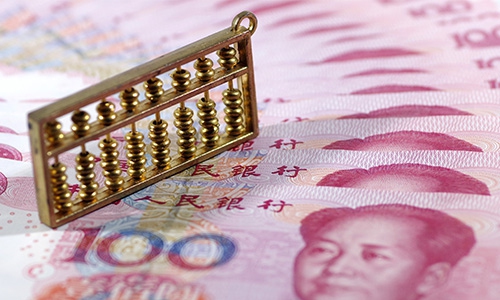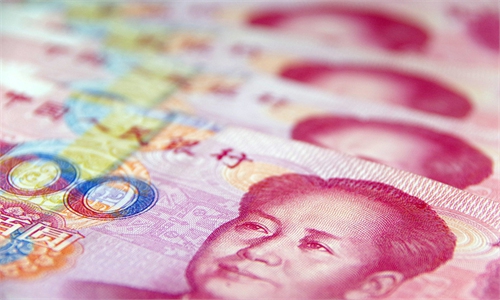Iraq’s plan for yuan settlement adds to growing de-dollarization trend against US dollar hegemony

Renminbi Photo: VCG
Iraq is reportedly pivoting to Chinese yuan to settle imports from China. Analysts said that the move sets a good example for other developing countries that have been victims of the US dollar's hegemony.
The Central Bank of Iraq said on Wednesday it plans to allow trade from China to be settled in yuan, Reuters reported. "It is the first time imports would be financed from China in yuan, as Iraqi imports from China had been financed in [US] dollars only," Mudhir Salih, the government's economic adviser, was quoted as saying.
Also, on February 7, the People's Bank of China, the central bank, said that it signed a memorandum of cooperation with the Central Bank of Brazil to establish yuan-clearing arrangements in Brazil.
These arrangements will help enterprises and financial institutions in the two countries conduct cross-border transactions using the yuan, and will help facilitate bilateral trade and investment, the bank said in a statement on its website.
"On the one hand, more countries' adoption of yuan comes from needs related to their growing bilateral trade and investment with China, given the massive Chinese market. On the other hand, it comes out of consideration for avoiding the US dollar's hegemony," Cong Yi, a professor at the Tianjin University of Finance and Economics, told the Global Times on Thursday.
While more economies have been seeking to replace the US-backed SWIFT system with fairer and cheaper services to avoid US monetary coercion, the sweeping US sanctions on Russia in the wake of the Russia-Ukraine conflict sent a sober warning about the risk of the US' weaponizing the dollar, Cong said.
The Fed pursued ultra-loose monetary policy after the outbreak of the COVID-19 pandemic in 2020. Public data showed that the Fed's balance sheet swelled from $4 trillion in March 2020 to nearly $9 trillion in 2022. The US government's fiscal stimulus amounted to about $10 trillion yuan over the past three years.
By taking advantage of dollar hegemony, the US flooded the globe with massive stimulus measures and then resorted to a rapid tightening of monetary policy in decades to curb high inflation, seriously disturbing global financial markets.
As a result, many developing economies that export commodities and borrow in dollars are facing risks including inflation, local currency depreciation and capital outflows.
According to Egypt's Central Agency for Public Mobilization and Statistics, the country's annual inflation continued its rise in January this year, hitting 26.5 percent, the highest since the end of 2017.
"After rounds of interest rate hikes, the US dollar's borrowing cost has risen to 5-6 percent, making it unacceptable for developing countries that borrow in dollars to maintain trade, financing and the economy," Tian Yun, an independent macroeconomic analyst, told the Global Times on Thursday.
"In contrast, the exchange rate of the yuan is much more stable, staying at around 7 against the dollar despite the Fed's faster-than-expected financial tightening, providing lower costs for those countries that need loans," Tian said.
Iraq's latest move represents only the first step of the de-dollarization trend across the world, as countries are expected to reduce the proportion of the dollar in their foreign reserves, and allow the use of the yuan in financing for local projects, he said.
As a continuation of Russia's systematic de-dollarization policy, the Russian Finance Ministry said in early February that it will reset the share of the euro in its National Wealth Fund starting from 2023, settling on gold, yuan and ruble, Russian media reported.
Cambodia is looking into joining the yuan-based Cross-border Interbank Payment System to provide additional international payment options, while facilitating and boosting trade, investment and tourism between the two countries, local media outlet The Phnom Penh Post reported on February 14.

